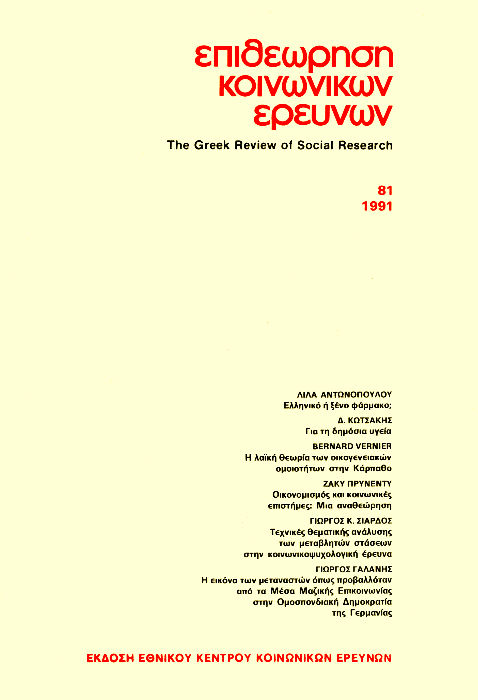Mythical representation of the world and male domination among Greek Pomacs
Abstract
This survey, which is part of a research program into domination
and/or exploitation relationshpis within the Greek family tries to
avoid falling into the double trap of theoretical formality on the one
hand and monography with no problematical dimension on the other.
Using the case study method, the analysis of relationships between
the sexes in a Pomac village enables us to analyse a particular type of
domination through which the exploitation of women becomes a
reality in some rural societies.
The sexual divisions of labour amongst the Pomacs cannot be
understood without reference to the system of mythical oppositions
which shapes all practices and divides them into male or female
categories. The apparent contradictions can be explained by the
technaeconomical as well as logical problems mythical thought is
faced with when materializing in the division of labour. However, if
mythical thinking can escape contradictions, it is because it classifies
activities according to different categories of classification by perceiv
ing every activity in multiple dimensions: the location, the required
posture, the relatively dirty nature of the work, etc.
In their dominant position in the production relations, the men
find ideological conditions within the mythical oppositions to. main
tain their domination. The mythical «rationale» screens domination
and exploitation relationships since it grounds each sex’s position on
the nature of things, since it tends to continuously provide proof ofits
genuinity and because it is relatively autonomous as regards the
domination and exploitation relationships it implies. Moreover, by
relegating women to a closed environment, by excluding them from
schools and cinemas, by separating them from money, the mythical
«rationale» becomes the basis of their total dependence and deprives
them of the intellectual tools and material means necessary for their
liberation.
Due to theirdominant position, the men have had the opportunity
of reinforcing their position through the changes caused by the
opening-up of Pomac society towards the outside world. These
changes have meant more work for and, above all, greater devalua
tion of women. In the future however, those changes will be agents
responsible for women’s liberation, as already shown in the ap
pearance of an acute awareness of their exploitation among young
girls.
Article Details
- How to Cite
-
Vernier, B. (1981). Mythical representation of the world and male domination among Greek Pomacs. The Greek Review of Social Research, 122–142. https://doi.org/10.12681/grsr.571
- Issue
- 1981: Numero Special
- Section
- Articles

This work is licensed under a Creative Commons Attribution-NonCommercial 4.0 International License.
Authors who publish with this journal agree to the following terms:
- Authors retain copyright and grant the journal right of first publication with the work simultaneously licensed under a Creative Commons Attribution Non-Commercial License that allows others to share the work with an acknowledgement of the work's authorship and initial publication in this journal.
- Authors are able to enter into separate, additional contractual arrangements for the non-exclusive distribution of the journal's published version of the work (e.g. post it to an institutional repository or publish it in a book), with an acknowledgement of its initial publication in this journal.
- Authors are permitted and encouraged to post their work online (preferably in institutional repositories or on their website) prior to and during the submission process, as it can lead to productive exchanges, as well as earlier and greater citation of published work (See The Effect of Open Access).




